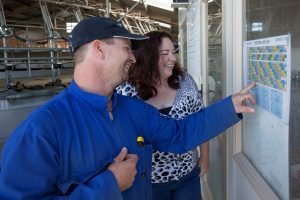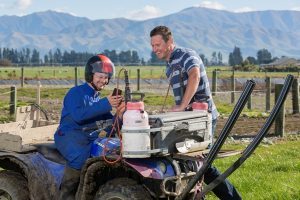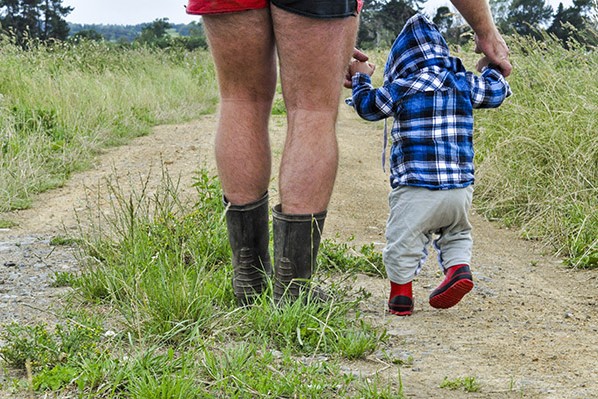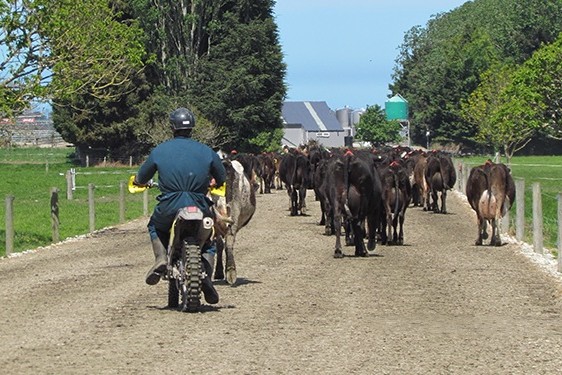Experience, rough and smooth, has taught Brent and Rebecca Miller the value of getting the balance right in the working and living environment. Anne Lee reports.
Finding balance on the farm encompasses a raft of areas but primarily it comes down to people, Canterbury contract milkers Brent and Rebecca Miller say.
They’re advocates for creating a working and living environment for the whole farm team that’s emotionally safe, fun and fair.
“When you do that, life’s enjoyable, everyone’s engaged and willing,” Rebecca says.
Not only does that make for a better, more positive work and personal life it also has a natural flow-on effect on both the top and bottom lines.
While they put plenty of effort into achieving excellence on the 900-cow, South Canterbury farm with pasture management, feeding cows well on high-quality feed and running great systems are all a focus – it’s the culture that means everyone’s genuinely eager to do things properly and efficiently and go that extra mile for the whole team.
“For instance, when someone’s going down to get the cows, they’re aware of all the jobs that need doing down that race.
‘They’ve all got a grubber and instead of waiting on their bike for the cows to move out they’ll go around and grub the thistles in that paddock.’
“They’ll take the gear with them to get as many of those jobs done as they can. They’ll take the reels and standards they need to set up the next breaks. They’ve all got a grubber and instead of waiting on their bike for the cows to move out they’ll go around and grub the thistles in that paddock. If the irrigator needs to be turned off or on – whatever the jobs – they’ll be thinking proactively about what else they can do while they’re there,” Brent says.
The couple met when Brent was at Telford with Rebecca’s brother completing a Diploma in Agriculture and since then, they’ve worked on farms in both Canterbury, Brent’s home province, and Waikato, where Rebecca’s from.

Rebecca’s a product of what some might term the “old school” where her parents worked every hour there was to climb the progression ladder and eventually get their own farm.
“It meant they didn’t get in till 10 o’clock at night sometimes so I’d have my little sisters bathed, fed and into bed,” she says.
They were also virtually itinerant through her formative years as they moved from job to job, growing cow numbers.
“I had 13 different primary schools and two colleges.”
So it’s no surprise that what Rebecca and Brent want for their own three children now is to stay put in the same district.
They’ve had some tough jobs – one in the North Island often had Brent working from 2.30am till 7.30pm at night and with a young toddler it meant the only chance for them to be together as a family was if they got in the farm truck with Brent during the day.
They also had a job where they were let down by broken promises and left depressed and full of self-doubt.
But they’ve had great jobs too, including farm manager positions in both the North and South Islands and their experience with Spectrum Group when they returned to Canterbury almost 10 years ago. “They taught us about systems and training along with their own culture and importance of a fair environment.”
So, the couple’s passion for creating a warm, positive, culture and putting people at the forefront stems from their own experiences – both good and bad.
“We’ve learned first-hand what we like and what we don’t, what creates a great environment and what doesn’t,” Rebecca says.
Her involvement with the Dairy Women’s’ Network and a Dairy Fatigue study led by Lynda Clark, along with Dr Rupert Tipples of Lincoln University also helped inform her views of creating a better working environment.
The DairyNZ’s Dairy Connect and DairyNZ’s Wellness and Wellbeing programmes have grown from the study and Brent is one of the Dairy Connect farmers providing advice and tips to others wanting help.
Rebecca has been accepted to the Kellogg Rural Leadership programme too this year with her project focusing on the application of emotional intelligence in farming, and the quadruple bottom line.

She’ll be researching what the cost savings and profitability are of having an engaged and stable team.
“I think what we’ve learned so far is that an environment where your staff feel emotionally safe is the greatest gift you can give your team.
“To do that you have to behave in such a way, and use appropriate language, so that people feel free to ask questions, they feel comfortable.
“You have to operate with integrity and do what you say you’re going to do,” Rebecca says.
The relationships farmers have with their staff are, in a way, like marriages that take work and open communication, she says.
“It’s that energy of give and take,” says Rebecca.
“We all live and work on the same place. We’re not in each other’s pockets but on a farm it is different to work places elsewhere,” Brent says.
They’re about to enter their fourth season on the 273-effective-hectare property owned by Andrew and Rachel Morris.
They started out as managers before taking on the contract managing role and will step up to a hybrid, variable-order sharemilking role this coming season.
Brent and Rebecca operate a flat management structure with three full-time staff as well as Brent working on the farm day to day.
Rebecca rears the calves and manages the accounts for the farm and the Morris’ other two nearby properties which include the 1400-cow Ealing Pastures and support block.
They have a 2IC and two herd managers with everyone trained and empowered to carry out all tasks.
“We make it clear in our interviewing process that if you’re not wanting to learn and be able to carry out most things on the farm, if you just want to milk the cows, then this isn’t the right culture fit for you,” Brent says.
But then interviews aren’t an annual event – their 2IC Roel Serrano is coming up to his 10th season, herd manager Graham Hart is about to roll into his fifth season and herd manager Randy Layno is in his third season.
The efficiencies they get from having great retention alongside the positive culture create a virtuous circle.
It all originates from the sincere focus on wanting to understand and know their team and make sure their needs are met too.
Not everyone wants to progress to management, sharemilking or ownership and being able to earn a good income, have stability in a district and grow assets and wealth in other ways can be just as appealing.
“You can’t assume everyone’s going to have the same goals as you and everyone’s goals are just as important as yours.
“The key is to understand their journey, and make sure you’re helping them move towards their own goals not away from them.
“Sometimes you need to step into their shoes and look at the world through their eyes, the result is empathy,” Rebecca says.
All their staff have families who are also seen as an extended part of the team ethos.
‘We’ve learned first-hand what we like and what we don’t, what creates a great environment and what doesn’t.’
They’ve been together as a team for so long they all know each other well, know what needs to be done onfarm and are all highly skilled.
On a personal level they look out for each other, can help with child care and have generally created a village feel.
That’s not to say they live a fairytale either – things go wrong and everyone’s human.
“But instead of shouting or snapping you take a deep breath and count to five before you react,” Brent says.
Employers can sometimes forget that staff aren’t automatically going to know the right way of doing something and they need training – never assume. Communicate, train, coach, mentor.
If things are going wrong and mistakes are being made repeatedly despite training then there’s probably something else going on, Brent says.
“Sometimes it’s actually that people aren’t engaged or empowered to make decisions. Or if they’re hiding their mistakes and not owning up to them it’s because they don’t feel emotionally safe enough,” he says.
“So that can all be pretty costly – and it can be a result of not having the right culture and environment onfarm,” Rebecca says.
Like Rebecca and Brent, a big driver for their staff is to be home in good time to be with their families.
Automatic cup removers and Protrac in the 60-bail farm dairy make it possible for milking to be a one-person job.
Cups are on at 5am with the first person milking the first herd. That takes around 1.5 hours with the second herd milked by another staff member who has started later.
When Brent’s on the morning milking, he milks right through both herds because he’s likely to be carrying out other tasks in the afternoon.
So no one, other than Brent, should have to milk longer than 1.5 hours.
Careful planning and good daily communication means everyone knows what must get done so everyone can get home on time at 5.30pm.
They have two breaks in the day – a one-hour breakfast and one-hour lunch.
“We know our team works 46 hours a week because we keep time sheets.
“Over the years we have been able to track and account where the pressure times are. This enables us to be proactive in our approach to the farm’s needs, while keeping the hours in check,” Rebecca says.
The whole team was involved in setting up the roster which is eight-days-on, two-off over calving and six-on, two-off through the rest of the season.
It’s an annual roster that’s set up before the season starts and is put up in the farm dairy so everyone knows what their days off are well in advance.
If someone has something specific they need to do, they can swap with someone else and work it out between them and that goes for Brent and Rebecca too.
“That’s the way everyone wanted it. The two days off aren’t the same each week on the six-on two-off but once every four to five weeks they fall on the weekend,” Brent says.
Those working Saturday and Sunday have lighter duties so they’re free to take more time off during the day between milkings.
“We set fences up on Friday and make a big effort to have most of the other farm jobs done during the week days so come the weekend the work can all be done during that milking period and people can be home with their family in between,” Brent says.
Developing the culture, having respect and creating the onfarm environment doesn’t cost anything but there are serious rewards both intangible and tangible.
“Our farm working expenses were $2.98/kg milksolids (MS) last season – $3.50/kg MS when runoff adjustments were added in – and I don’t think we’d be anywhere near that without the team we have and the culture on farm,” Brent says.
Farm facts
Farm owners: Andrew and Rachel Morris
Contract milkers: Brent and Rebecca Miller
Area: 272ha effective
Cows: 900 crossbred
Production: 500kg MS/cow
Supplement: 700kg DM/cow
Farm Dairy: 60-bail rotary with Protrac and ACRs
FWE: $2.98/kg MS
Operating costs: $3.50/kg MS (including runoff adjustment)





